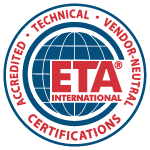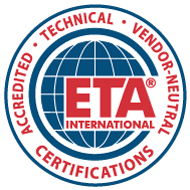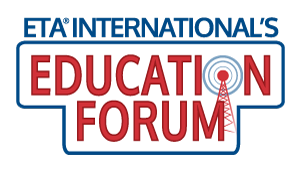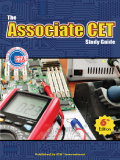
REGISTRATION FOR THE 2025 EDUCATION FORUM IS OPEN!
ETA will co-locate the 2025 Education Forum (March 17-20, 2025) with the IWCE conference in Las Vegas, NV at the Las Vegas Convention Center. The show will be focused on providing training through outside vendors as well as seminars in popular technology areas related to ETA certification.
What is Education Forum?
The ETA Education Forum event offers individuals the opportunity to network, collaborate, and train. Event participants are given an opportunity to discuss training demands, recent developments in emerging technologies, and industry trends. Those attending the available training sessions will have the opportunity to become certified as part of the class. Certification is important in this competitive job market, and remains a vital part of electronics-related industries.
Co-Located with

Who attends Education Forum?
Attendees at the ETA Education Forum include: faculty in technology programs who want to gain knowledge about new technologies, and how to expand existing programs; college representatives, program development specialists, and counselors who are interested in creating and maintaining electronics programs and in developing strategies for recruiting students; industry trainers and managers who want to gain insight from educators; workforce development personnel from government, labor, business, and education who are involved in shaping electronics programs; individuals concerned with current industry trends, emerging technologies and educational programs.
Why attend the Education Forum at IWCE?
Need a justification letter to convince your boss? Try this one!
2025 Technical Training
ETA International is proud to provide training through outside vendors in popular technology areas leading to ETA certification. Training courses must be purchased separately and are not part of any IWCE conference package. Registration includes access to IWCE's Exhibit Hall. Please check back often for updates.
Associate Certified Electronics Technician (CETa)
Date: Wednesday, 3/19 & Thursday, 3/20
Time: 8:00am–4:00pm
| Course Description | Certification |
|---|---|
|
The Associate certification is designed for technicians who have less than two years of experience or trade school training for electronics technicians. Topics covered include: DC Electronics, AC Electronics, Components & Semiconductors, Analog Circuits, Re-cabling & Telecommunications, Digital Circuits & Microprocessors, Troubleshooting, Test Equipment & Repair, Shop & Service Management. Every Certified Electronics Technician (CET) candidate must pass the Associate exam before they can qualify to sit for the full Journeyman certification. Once a technician has completed the four-year term, they should specialize and take a Journeyman option. This course includes the Associate CET Study Guide.
|
CETa |
|
Course Cost: $749 or $849 onsite | Test only option $65 Certification: ETA's Associate Certified Electronics Technician (CETa) Certification Cost: included in the price of the workshop |
Broadband Fiber Optic Technician - Level 1 (BFI)
Date: Monday, 3/17 & Tuesday, 3/18
Time: 9:00am-5:00pm
Date: Wednesday, 3/19
Time: 8:00am–5:00pm with extended lunch break for exhibit hall from 11am-2:00pm
Date: Thursday, 3/20
Time: 8:00am-4:00pm
| Course Description | Certification |
|---|---|
|
This foundational level instructor-led course is comprised of a two-day introduction to broadband FTTH theory and fiber followed by two days of hands-on skills training to apply that theory to practical tasks. Areas of focus are FTTH and PON methodologies, topologies, optical distribution networks, cable management and installation practices, testing and maintenance, optical cable types, connectorization, splicing methods, and safety best practices. Prerequisites: Completing the prerequisite Fiber Foundations online short course will prepare learners to enter this class with a basic understanding of fiber optic principles. |
BFI |
|
Course Cost: $2,400 | Test only option $155 Certification: ETA's Broadband Fiber Intaller (BFI) Certification Cost: included in the price of the Four-Day workshop |
Communication Site Installer (R56)
Date: Monday, 3/17 & Tuesday, 3/18
Time: 9:00am–5:00pm
Date: Wednesday, 3/18 & Thursday, 3/19
Time: 8:00am–4:00pm
| Course Description | Certification |
|---|---|
REQUIRED: Students must bring a laptop to the class.The Site Installation Practices (R56) Workshop course is designed to present the standards and guidelines for installing a Motorola Solutions communication system. Participants will understand how a properly installed system can help to ensure a safe and efficient communications system, reducing system downtime. All students are encouraged to download the Preparation Guide. After completing this course, the student will be able to:
There are no prerequisites, but students must be a graduate of a basic electronics course. |
R56 |
|
Course Cost: $1,899 or $1,999 onsite | Test only option $105 Certification: ETA's Communication Site Installer (R56) Certification Cost: included in the price of the workshop |
Distributed Antenna Systems Technician (DAST)
Presenter: Ira Wiesenfeld, PE, CETms(RF) and Joseph Delio, CETma, CETms(RF), IWA Technical Services, Inc.
Date: Monday, 3/17 & Tuesday, 3/18
Time: 9:00am–5:00pm
| Course Description | Certification |
|---|---|
|
IWA Technical Services Inc. offers a comprehensive DAST training program that combines both theory and practical experience. It focuses on in-depth theoretical instruction, covering essential topics such as start-up procedures, system calibration, and the optimization of active and passive components. The training features hands-on demonstrations, allowing participants to apply their knowledge and make the necessary measurements using advanced test equipment, including the PCTEL Seehawk scanning receiver. This practical experience is invaluable for ensuring that professionals are proficient in using the latest tools and techniques to prevent signal interference, maintain system performance, and ensure compliance with the International Fire Code (IFC) and National Fire Protection Association (NFPA) standards. This blend of theory and practice equips trainees with the skills needed to confidently turn-up, optimize, and manage DAS systems in order to perform recurring testing for long-term operational success. |
DAST |
|
Course Cost: $1,049 or $1,099 onsite | Test only option $105 Certification: ETA's Distributed Antenna Systems Technician (DAST) Certification Cost: included in the price of the workshop |
General Communications Technician Training - Level 1 (GCT1)
Date: Monday, 3/17 & Tuesday, 3/18
Time: 9:00am–5:00pm
| Course Description | Certification |
|---|---|
|
The General Communications Technician-Level 1 certification program introduces the attendee to basic elements of various communications concepts and technologies. This includes basic electronics, fundamentals of radio, tools, test equipment, power systems, cabling and installations, environmental systems, antennas, transmission lines, operating principles and details on radios and radio systems, serial data and IP networks, basics of fiber optic lines and systems, telephony, satellite communications, physical plant considerations, site procedures and safety practices. LMR communications, satellite, telephone, data, and computer technologies used in incident response and planned events. General Communications Technician-Level 1 trains technicians on the practices and procedures common to radio communication technicians. This course will help communications technicians work within the Incident Command System (ICS) organizational structure. It is intended for novice technicians or anyone that needs a basic technical understanding of communications systems. This course is ideal for federal, state, local, and tribal emergency response professionals and coordination/support personnel with communications backgrounds. Individuals who are responsible for managing a Strategic Technology Reserve (radio cache, mobile communications vehicle, or other deployable communications assets) are encouraged to attend. GCT1 is modeled after the US Department of Homeland Security's COM-T program. The General Commmunications Technician Study Guide - Level 1 is included in the fee. |
GCT1 |
|
Course Cost: $1,049 or $1,099 onsite | Test only option $105 Certification: ETA's General Communications Technician-Level 1 (GCT1) Certification Cost: included in the price of the workshop |
General Radiotelephone Operator License - Elements 1 & 3 (GROL)
Date: Monday, 3/17 & Tuesday, 3/18
Time: 9:00am–5:00pm
Date: Wednesday, 3/19
Time: 8:00am–4:00pm
| Course Description | Certification |
|---|---|
Important: The FCC General Radiotelephone Operator License (GROL) Course is an intensive, three-day, instructor-led in-person training designed for individuals seeking to obtain the prestigious GROL license, essential for operating and maintaining radio equipment used in aviation, maritime, and land mobile services, as well as global fixed communication stations. This license is mandated by the Federal Communications Commission (FCC) for many roles in telecommunications, broadcast engineering, and other technical fields. This intensive course covers radio communication principles, FCC regulations, and radio systems maintenance, fully preparing participants to pass the FCC Element 1 and Element 3 exams. Course Objectives:
|
GROL |
|
Course Cost: $1,549 or $1,599 onsite | Test only option $50 License: General Radiotelephone Operator License (GROL) Certification Cost: included in the price of the workshop |
Line and Antenna Sweep (LAS)
Date: Wednesday, 3/19 & Thursday, 3/20
Time: 8:00am–4:00pm
| Course Description | Certification |
|---|---|
REQUIRED: Students should bring their FDR or VNA, calibration kit (w/ phase stable cable), and a laptop for the manual.Line and Antenna Sweep (LAS) testing has been with us for years but now test equipment size and cost have dropped dramatically. Handheld units now bring line sweeping into the field at a technician level. Carrier and equipment manufacturers develop installation Methods of Procedures to ensure every decibel of signal strength is maximized in the increasingly crowded RF spectrum. Line and antenna sweeping are critical tests for the installation, maintenance, and troubleshooting of antenna components and networks. The course is about moving beyond a simple wattmeter test when installing or maintaining any antenna system. A review of decibels, Return Loss, and VSWR along with the standard tests used for LAS will be covered. Many examples will be presented, and hands-on exercises will be conducted to ensure students are prepared to better understand antenna systems. The ETA LAS certification test will be available upon completion of this course. |
LAS |
|
Course Cost: $1,049 or $1,099 onsite | Test only option $105 Certification: ETA's Line and Antenna Sweep (LAS) Certification Cost: included in the price of the workshop |
Microwave Fundamentals - Microwave Radio Technician (MRT)
Date: Wednesday, 3/19 & Thursday, 3/20
Time: 8:00am–4:00pm
| Course Description | Certification |
|---|---|
|
With the explosion of new digital applications in today’s communication networks microwave radio offers many advantages. They are capable of carrying large amounts of information (voice, video, and data); they require smaller antennas than other RF communication bands; microwaves signal easily propagate around objects; and microwave equipment has proven very reliable. The microwave spectrum is generally described as running between 500 MHz and 300 GHz. At these frequencies, wavelengths become relatively short, and measure between 1 cm and 60 cm in length. Microwave systems have proven capable of effectively processing and transmitting both analog and digital intelligence. Microwave technicians, therefore, must be equally versed in frequency modulation (FM) and digital modulation techniques. In this course we will take a system approach in our examination and analysis of microwave radio communication. Participants will be exposed to: RF safety fundamentals; RF spectrum and frequency concepts; microwave radio system configurations; RF modulation schemes (CW, AM, FM,& PW); digital microwave coding/decoding techniques; principles of Quadrature Amplitude Modulation (QAM) and Phase Shift Keying (QPSK); microwave radio equipment (TX & RX block diagrams, microwave/digital interfaces, performance indicators, bit error rates (BIT), microwave timing and synchronization schemes, and radio protection configurations); microwave propagation characteristics (line-of-sight restrictions, electromagnetic waves, path-related anomalies, and Fresnel zone clearance); microwave antenna systems; and common microwave test equipment and procedures. Upon successfully passing ETA’s microwave radio technician (MRT) examination participants will be awarded ETA certification. |
MRT |
|
Course Cost: $1,049 and $1,099 onsite | Test only option $105 Certification: ETA's Microwave Radio Technician (MRT) Certification Cost: included in the price of the workshop |
Practical Antenna Basics (PAB) - Making Sense of RF Propagation in Everyday Communication Systems
Date: Monday, 3/17 & Tuesday, 3/18
Time: 9:00am–5:00pm
| Course Description | Certification |
|---|---|
|
In this course participants will be introduced to basic antenna theory. We will examine the fundamental principles of RF propagation and explore the antenna’s critical role in wireless communication systems. A major problem in any wireless communication system is the efficient transformation of internal circuit voltage and current into electromagnetic energy. Encoded and modulated with analog intelligence or digital data, electromagnetic radiation can then be propagated though space. The transformational complexity often results in an over-simplified explanation of an antenna as just a passive device with strange and magical abilities. Those attending this course will learn to dispel any mystical nature and develop a sound practical understanding of how antennas work. Topics addressed will include: the evolution of antenna theory (Maxwell’s equations, Faraday’s law, Ampere’s law, Marconi and Hertz); electrical to electromagnetic conversion (E and H field interaction, polarization, wave-fronts); characteristics of RF propagation (refraction, diffraction, fading, and travel path); half-wave dipole antenna development (effects of impedance, radiation and induction); antenna power ratios (dB’s and dBm’s); antenna performance (gain, directivity, reciprocity, radiation fields, beam-width, directionality); antenna feed lines (resonant and non-resonant); antenna design considerations (monopole antennas, antenna arrays, and electrical vs. physical length); specialized antennas (log-periodic, small-loop, folded di-pole, and slot antenna); microwave antennas (horn, parabolic reflector, lens and patch antennas); and common non-proprietary antenna installation, alignment, and maintenance practices. Upon successfully passing ETA’s antenna competency examination participants will be awarded ETA’s practical antenna basics (PAB) certification. |
PAB |
|
Course Cost: $1,049 or $1,099 onsite | Test only option $105 Certification: ETA's Practical Antenna Basics (PAB) Certification Cost: included in the price of the workshop |
Radio Frequency Interference Mitigation (RFIM)
Date: Monday, 3/17 & Tuesday, 3/18
Time: 9:00am–5:00pm
| Course Description | Certification |
|---|---|
|
This course will provide a background in the frequency spectrum and RF technology and review causes and sources of interference. Spectrum analyzers will be covered in detail along with software functions and tools to support interference hunting. Many interference hunting cases will be presented. Students will have hands-on time with a variety of modern commercial spectrum analyzers. A “Tiny SA” spectrum analyzer will be given to the students for use during the labs. The content will include:
|
RFIM |
|
Course Cost: $1,149 or $1,199 onsite | Test only option $105 Certification: ETA's Radio Frequency Interference Mitigation (RFIM) Certification Cost: included in the price of the workshop |











